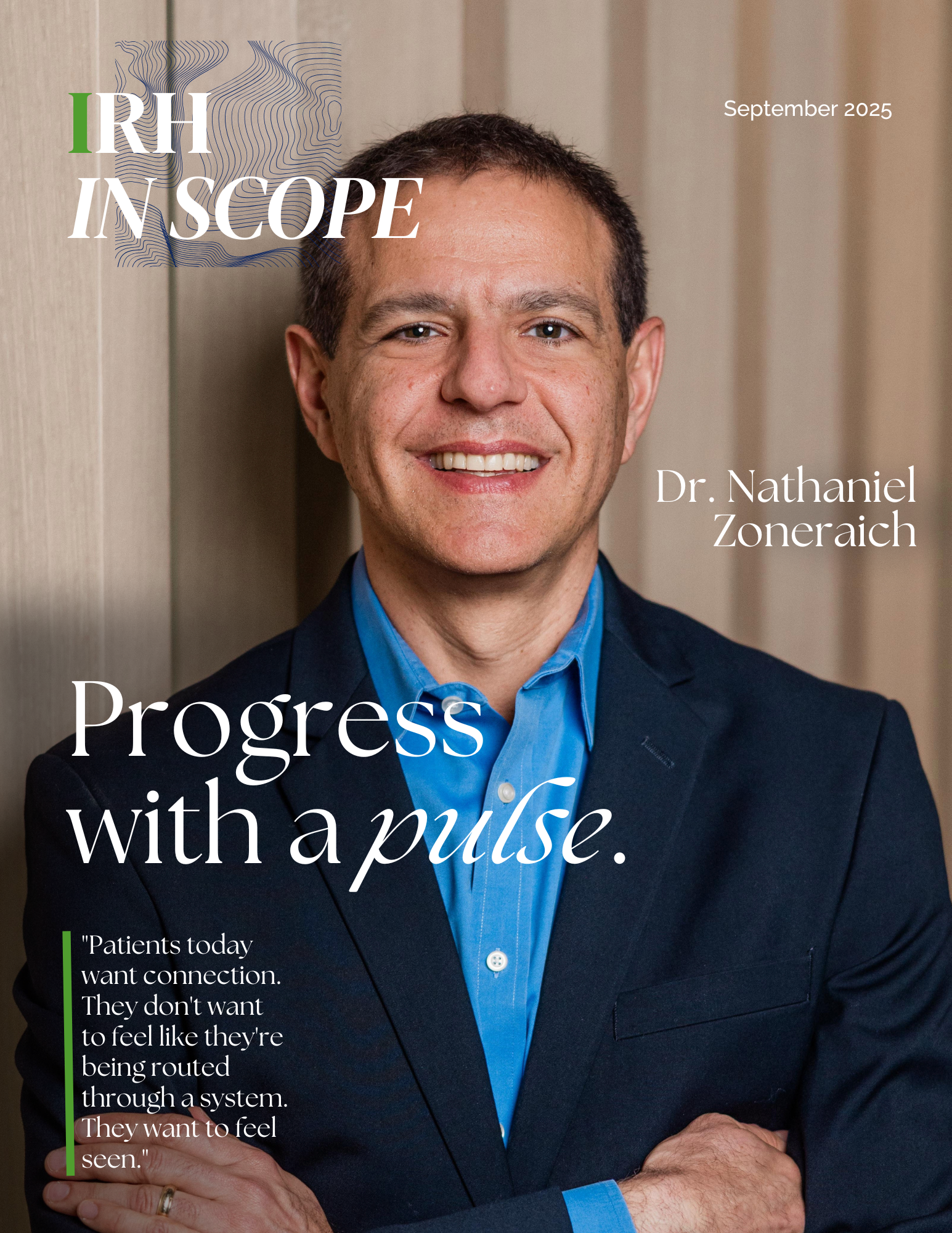When Dr. Nathaniel Zoneraich reflects on how he got here, from learning medicine at his mother's side in New Jersey to running a nationally recognized fertility practice in Arizona, he talks less about ambition and more about alignment. "I thought I was going to be a general OB-GYN," he said. "Then I did my infertility rotation, and that was it. It checked every box for me."
A Reproductive Endocrinologist, founder of Advanced Fertility Care (AFC), and Chief Medical Information Officer at Pinnacle Fertility, Zoneraich has helped build a model that's equal parts high-tech and high-touch.
Rooted in Women's Health from the Start
Zoneraich's medical foundation was shaped by his mother, an OB-GYN who emigrated from Romania in 1964 and became the first female OB-GYN resident at Cornell Medical College. "She didn't speak English when she arrived," he noted. "And then she went on to run her own solo practice. Watching her taught me a lot, not just about medicine, but about resilience."
That early exposure shaped his sensibility. After earning his undergraduate and medical degrees from Cornell and completing his residency at Case Western Reserve University, Zoneraich completed a fellowship in reproductive endocrinology and infertility at Emory University. Fertility care stood out for its combination of science, surgery, relationships, and rapidly evolving tools.
“Patients today want connection. They don't want to feel like they're being routed through a system. They want to feel seen.”
Even the best clinical teams need expert genetic support
57% of Fertility Patients Had Missed Risks. 42% Changed Clinical Care.
Modern fertility care demands systems that keep pace with genetic complexity - without losing the human connection.
57% of patients had missed genetic risks in routine screenings.
42% of those had significant findings that changed clinical care.
Inconsistent counseling = legal exposure, care gaps, and lost trust. GeneScreen delivers concierge-level, comprehensive genetic counseling that integrates with your team - scalable, accurate, and patient-centered.
Building a Practice and a Philosophy
In 2005, he opened AFC in Scottsdale. Starting as a solo practitioner, he learned every role inside the clinic: "billing, front desk, phlebotomy, you name it," he said. "You can't lead a team without understanding the challenges they face."
From those roots, his approach evolved: see patients clearly, explain the science honestly, and surround yourself with a team empowered to deliver excellent care.
Technology That Serves Patients
While he believes in innovation, Zoneraich is wary of technology for its own sake. "We've seen remarkable advancements, genetic screening, lab conditions, and medication protocols. But tools only help if they improve communication, access, and outcomes."
One example? Real-time responsiveness. AFC utilizes secure messaging and dedicated patient navigators, ensuring patients receive answers promptly without waiting days for a callback. "Patients today want connection. They don't want to feel like they're being routed through a system. They want to feel seen." Zoneraich believes his role as CMIO at Pinnacle Fertility helps him scale this philosophy across the network.
GeneScreen is excited to sponsor the delivery of this story as they share Dr. Zoneraich’s belief in empowering patients through expert guidance and clarity. GeneScreen offers concierge-level genetic counseling across the U.S. and Canada, with over 45 board-certified genetic counselors licensed in all 50 states. Their genetic counseling services include customizable workflows that stratify patients by their carrier screening results and risk level, providing tailored follow-up and guidance. In addition, in-network insurance billing, provider portals with real-time patient updates, EHR integrations, and seamless collaboration with fertility specialists help streamline physician processes while supporting patients in making informed reproductive decisions with confidence.
A Field in Flux, A Practice That Adapts
Zoneraich believes COVID forced fertility care into a new era. "Suddenly, everything we thought was essential had to be reevaluated. Could we offer virtual consults? Can we develop more efficient systems for the lab? Could we scale access without losing intimacy?" He credits clinics that pivoted quickly and invested in operational strategy as the ones that came out ahead. "The demand exploded post-COVID. Patients realized how much they valued family building. Clinics that couldn't scale struggled."
His answer? A top-of-license model. "Let everyone do what they're best trained for. Let your phlebotomists draw, your navigators coordinate, your doctors lead, but don't make anyone do everything. That's how you stay agile."
“There are certain interactions that should always be physician-led. Maintaining the human connection, even as we adopt technology, is what keeps us grounded.”
When asked what patients value most today, Zoneraich doesn't hesitate. "Trust. Coordination. And anticipation."
He explains that if a patient senses disorganization or indifference at the start of their care, it sticks with them. "If they don't trust your systems, they may micromanage out of fear. But if they see that your team is dialed in and proactive, they can focus on the emotional and medical parts of the process."
It's a subtle shift from the buzzwords of "patient-centered care." For Zoneraich, it's more operational: "Are we anticipating what the patient needs before they ask? Are we giving them clarity early, so they aren't stressed later?"
Collaboration Over Competition
With over 50 physicians and more than a dozen clinics in the Pinnacle network, Zoneraich sees enormous potential for peer learning. "There's no reason to reinvent the wheel in every market. We've got brilliant minds across the country; we should be sharing what works."
He's passionate about building forums and processes that make this possible. "Too many doctors operate in silos, even within the same organization. That's a missed opportunity."
The Future: No More Paper Charts, No More Guesswork
Zoneraich jokes that he's a technology geek, but it's not far from the truth. He was an early adopter of EMR systems and believes AI can assist with embryo selection, risk modeling, and predictive analytics in ways the field hasn't yet fully embraced.
But he also knows that fertility treatment isn't one-size-fits-all. "Patients today want transparency, accessibility, convenience, and most of all successful outcomes. We have to design our systems with those goals in mind."
He also emphasizes the importance of continual improvement. "We don't just celebrate success and move on. We say: how can this be better? What's the next iteration?"
Advice to the Next Generation
When asked what advice he gives newer physicians, Zoneraich pauses. "Don't be afraid to try something new. You will fail at some of it. But if you're only doing what's safe or what's always been done, you're not growing."
He also urges future fertility leaders to pay attention to operations, not just medicine. "No one teaches us how to run a practice. But that's what ultimately defines the patient experience. Learn it. Care about it."
In speaking with Dr. Zoneraich, two themes emerge repeatedly: progress and presence. “The field keeps changing,” he said. “But what doesn’t change is how much this matters to our patients. That should always guide how we innovate.”
Even the best clinical teams need expert genetic support
57% of Fertility Patients Had Missed Risks. 42% Changed Clinical Care.
Modern fertility care demands systems that keep pace with genetic complexity - without losing the human connection.
57% of patients had missed genetic risks in routine screenings.
42% of those had significant findings that changed clinical care.
Inconsistent counseling = legal exposure, care gaps, and lost trust. GeneScreen delivers concierge-level, comprehensive genetic counseling that integrates with your team - scalable, accurate, and patient-centered.
The advertiser does not have full editorial control over the content of this article. As a brought-to-you-by sponsor of IRH In Scope, the advertiser only has editorial control over what is mentioned about their company. Inside Reproductive Health maintains full editorial independence over the remainder of the article. The views and opinions expressed in this article do not necessarily represent the views of the Advertiser or of Inside Reproductive Health.







